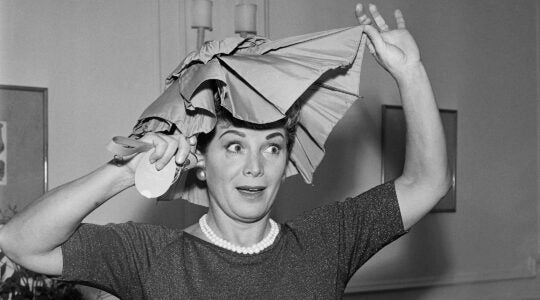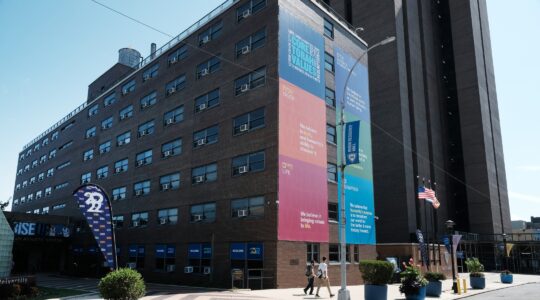If the fledgling National Jewish Theater were telling its own story on stage, it might bear a striking resemblance to the one about that idealistic Spaniard tilting at windmills.
Start a theater company specializing in Jewish fare at the height of the Great Recession — and with the fresh memory of the Broadway revival of Neil Simon’s “Brighton Beach Memoirs” shuttering after only a week of performances?
Only Don Q., or perhaps the Irish dreamer Finian McLonergan (the star of the soon-to-close Broadway revival of “Finian’s Rainbow”), could conceive of such a thing.
But just off a sold-out limited run at Baruch College of Theodore Bikel’s homage to Sholom Aleichem, Arnold Mittelman, the producer-director who launched the NJT quietly in 2008, isv thinking big.
Broadway big.
Mittelman, 64, who for 20 years ran Miami’s Coconut Grove Playhouse until its closing in 2006 amid a mountain of debt, is now planning a Broadway revival of “The Rothschilds,” the 1970 musical for which Hal Linden won a Tony Award.
Explaining a spate of recent closings on Broadway, Mittelman — in an interview with The Jewish Week at an outdoor café in Fort Lauderdale — said of those shows, “They had no stars.”
“My ‘Rothschilds’ will have stars,” he said, adding that he could not name them because they had not yet been signed. “And I have a feeling that there is a certain kind of market for ‘The Rothschilds’ that is tied to the way we market to the greater Jewish community. The material itself has tremendous relevancy.”
Mittelman said the show — which tells of the rise of the Rothschild family from its humble beginnings in Germany to the founding of a financial empire — would open later this year or in 2011, either in regional theaters or on Broadway. The show, which Mittelman says will be a $7 million to $9 million production, would be the first full-scale play mounted by the National Jewish Theater. Mittelman, who said the average Broadway play costs as much as $15 million to mount, said he hopes to attract major donors to subsidize tickets “so that younger people will see it,” with tickets going for as little as $50 or $65.
Mittelman says the story of the Rothschilds could be seen as an antidote to the Bernard Madoff scandal, one in which “Jewish entrepreneurs became philanthropists and used their fortune to help others and better mankind.”
Not everyone is sold on the idea of reviving “The Rothschilds” in today’s theater environment. “Given the current Broadway climate, you would need Hugh Jackman as Mayer Rothschild,” said legendary Broadway producer Manny Azenberg, who has produced much of Neil Simon’s work. “Nevertheless, I wish him much mazel.”
The NJT has already presented three more modest productions: Bikel’s one-man production of “Sholom Aleichem: Laughter Through Tears”; “The Soul of Gershwin: The Musical Journey of an American Klezmer”; and “The Kosher Cheerleader,” a one-woman show written by and starring Sandy Wolshin.
The latter show is slated to open here this summer at a venue yet to be selected. It had its premiere last weekend at the Arizona Jewish Theater in Phoenix.
“We’re looking at either Off-Broadway or the JCC of the Upper West Side,” Mittelman said. “A lot has to do with availability, the compatibility of the space to the show and the way it works for the target audience. I want something that is user-friendly. … It’s funny and done in a clever way. It’s about acquiring wisdom and getting comfortable in one’s own skin.”
In a telephone interview with The Jewish Week, Bikel said his show did so well here that “we’ll probably bring it back.” He said it could not be held over because it was booked in other cities.
Mittelman pointed out that the National Jewish Theater will not only stage its own shows but also “other people’s work.” Bikel’s show was developed at Theater J in Washington, D.C.
“If I can give life to shows, I want to do that,” he said. “That is where others made an error — feeling they have to create shows themselves.”
Such an effort “stands a chance at success because he has no fixed expenses,” said Haim Shaked, director of the Miller Center for Contemporary Judaic Studies at the University of Miami.
“He doesn’t have a building that has to be maintained or pay the rent on, and he doesn’t have a permanent team that needs to be supported,” Shaked said. “He can pick and choose shows and take them to theaters where he pays the rent when he wants to use it.”
And because he does not have the pressure of having to find enough moneymaking shows to keep a theater open, Mittelman has the luxury of being selective about the shows he wishes to produce.
Staging good material is another key to the success of this venture, according to Jack Klugman, the actor who was among the National Jewish Theater’s inaugural funders.
“One play does not make a success,” he said in a phone interview from his home in California. “You need to have good product. … I think the Jewish Theater should be talked about and that everything [of quality] should be done there that has a Jewish theme.”
Bikel, who wrote his one-man show, expressed that same sentiment.
“It’s all about the quality of the show you are producing and presenting,” he said. “It’s not a question of commercial success; it’s a question of qualitative success. … The National Jewish Theater will stand or fall by the quality of the product.”
Not having a permanent home allows the theater’s producer to “go wherever the audiences are instead of asking people to make pilgrimages to where you are,” Bikel added, noting that the success of his show is “proving the point.”
But the National Jewish Theater may be fighting a powerful trend. More than a decade ago, two other Jewish theater companies — the Stanley Brechner’s American Jewish Theater and Ron Avni’s Jewish Repertory Theater, both based here — folded after many years. They fell victim to changing tastes and demographics among the theater-going public.
Asked about the failure of “Brighton Beach Memoirs,” Bikel said he was at a loss to explain it. The show, one of the biggest commercial flops on Broadway in recent memory, cost $3 million to produce but reportedly never grossed more than $125,000 a week in ticket sales during preview performances — an amount that failed to cover production costs.
“Simon writes Jewish theater,” Bikel said. “Its failure had nothing to do with the Jewishness of the play.”
Mittelman cited a press report suggesting the play’s closing stemmed from its failure to generate ticket sales in the traditional way, instead relying exclusively on heavily discounted offers in The New York Times.
Bikel said he would like to see the National Jewish Theater produce shows that have Jewish content and themes.
“They could be written by non-Jews, but they need to speak of something that moves something in the Jewish psyche,” he explained.
Michael Berenbaum, former project director of the United States Holocaust Memorial Museum in Washington, D.C., and later its Holocaust Research Institute, said he became involved with Mittelman because of Mittelman’s desire to create a databank and archive of theater that relates to the Holocaust, with the ability to make permanent recordings of such theater.
“We just had a film shown at the United Nations about artists who created work while the Shoah was going on,” Berenbaum said.
“There was enormous cultural creativity while the Shoah was taking place and I’m anxious to capture whatever we can. In my field, we know the impact of theater. I am mindful of the way in which theater has had an impact on world culture, and the way ‘The Diary of Anne Frank’ influenced 50 years of teenagers who played the role and felt themselves touched and shaped by the Holocaust. I take seriously the role of theater.
“I would suggest that one area of Jewish life that is indisputably thriving is culture,” Berenbaum continued. “There is no doubt we are living in a time of great variety, diversity, originality and quality of Jewish culture. For many people, this is a window into Jewish identity and into Jewish life.”
He also says a key to success is a good product.
“We were asked the same question years ago — was there a need for a Holocaust memorial museum. Nobody asks that anymore because we created a need. … I don’t know his [Mittelman’s] chances for success. I do know the opportunities he has.”
As one person intimately involved in the theater community here said, “It doesn’t make any sense that there is not a national Jewish theater given that there are so many other parts of the population whose needs are being addressed by some other group somewhere, and given the level of potential support in New York.”
The woman, who asked not to be identified because she was not authorized by her theater organization to speak, said the National Jewish Theater is coming on the scene at a time of diminishing audiences for live performances and in the midst of a recession. But, she said, “Mittelman’s idea is a very enlightened concept — not needing a brick-and-mortar home and not needing to be housed in New York to be considered a national theater.”
The New York Jewish Week brings you the stories behind the headlines, keeping you connected to Jewish life in New York. Help sustain the reporting you trust by donating today.




